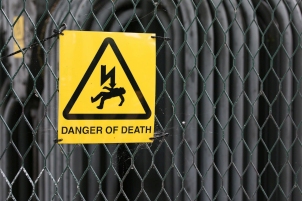The Bible on Murder
Continuing our discussion on the borders of life, let’s take a closer look at what the Bible says about murder.
We’ve repeated it several times now – every human has incredible value in God’s eyes. God made this clear even in his covenant with Noah:
Whoever sheds the blood of man,
Genesis 9:6
by man shall his blood be shed,
for God made man in his own image.
Yes, the image of God (imago dei) is important when it comes to our discussion of murder – God Himself says so. (Read Part 3: The Image for more details on the image of God.)
Coming to the Ten Commandments, we have the well-known words – well, especially in old English – “Thou shalt not kill.”
That word for “kill” is an interesting word. I’m told that there are actually seven different Hebrew words for “kill”. The idea here is not that we should never kill anything, like a caterpillar or a cow. We also know from the rest of the law given to Moses that God does order certain legal executions. And so the idea here is what we would call murder – taking a human life that you should not take. And there are very few exceptions to this in the law.

So we might say in English, “You shall not murder”. But things get more complicated from there. For example, there’s intentional murder and unintentional murder. It gets confusing to get into all the legal terms, but an example of unintentional murder might be “involuntary manslaughter”.
You can kill simply by doing something reckless, or by being negligent. In fact, you can kill by doing nothing. So that could be involuntary manslaughter through negligence. Maybe you want to save money, so you stop feeding your kid. (Don’t do that.) Or, I dig a hole in my front yard, and someone falls in and breaks their neck. (Maybe put up a fence next time.) Negligence.
Again, this is not an article about legal definitions – I’m aware that a lot more nuance would be required. But we just need to be aware of some of the general categories.
You can kill someone entirely by mistake. Involuntary homicide.
And we could go on, but those are some basic concepts. And these general concepts are in the Bible. And it all starts with Genesis 1, and the purpose of the Creator. After all, if we’re all just bags of chemicals, what does it matter if those chemicals get rearranged?
Let’s look at a few passages today and see what kind of homicide might be involved.
But if anyone hates his neighbor and lies in wait for him and attacks him and strikes him fatally so that he dies, and he flees into one of these cities, then the elders of his city shall send and take him from there, and hand him over to the avenger of blood, so that he may die. Your eye shall not pity him, but you shall purge the guilt of innocent blood from Israel, so that it may be well with you.
Deuteronomy 19:11-13
Easy – this is premeditated, first degree murder.
This is the provision for the manslayer, who by fleeing there may save his life. If anyone kills his neighbor unintentionally without having hated him in the past— as when someone goes into the forest with his neighbor to cut wood, and his hand swings the axe to cut down a tree, and the head slips from the handle and strikes his neighbor so that he dies—he may flee to one of these cities and live,
Deuteronomy19:4-5
Here we have unintentional homicide. It could be because of negligence (if you knew that the axe head was loose), but looking at the details here it’s probably just talking about something totally unintentional.
When you build a new house, you shall make a parapet for your roof, that you may not bring the guilt of blood upon your house, if anyone should fall from it.
Deuteronomy 22:8
In a culture where people are often on the roof, if you don’t make it safe it’s definitely negligence. Like not putting a fence around that hole, or around your swimming pool.
It’s usefully to summarize intentional, illegal (against God’s law) killing of a human being as murder. But there is guilt involved in other types of killing, right? If someone drives dangerously, and someone dies as a result of an accident, the driver is guilty.
There’s a lot to talk about here! But now that we have some of the basic categories down, we’ll start by talking about the first border of life – the beginning.
